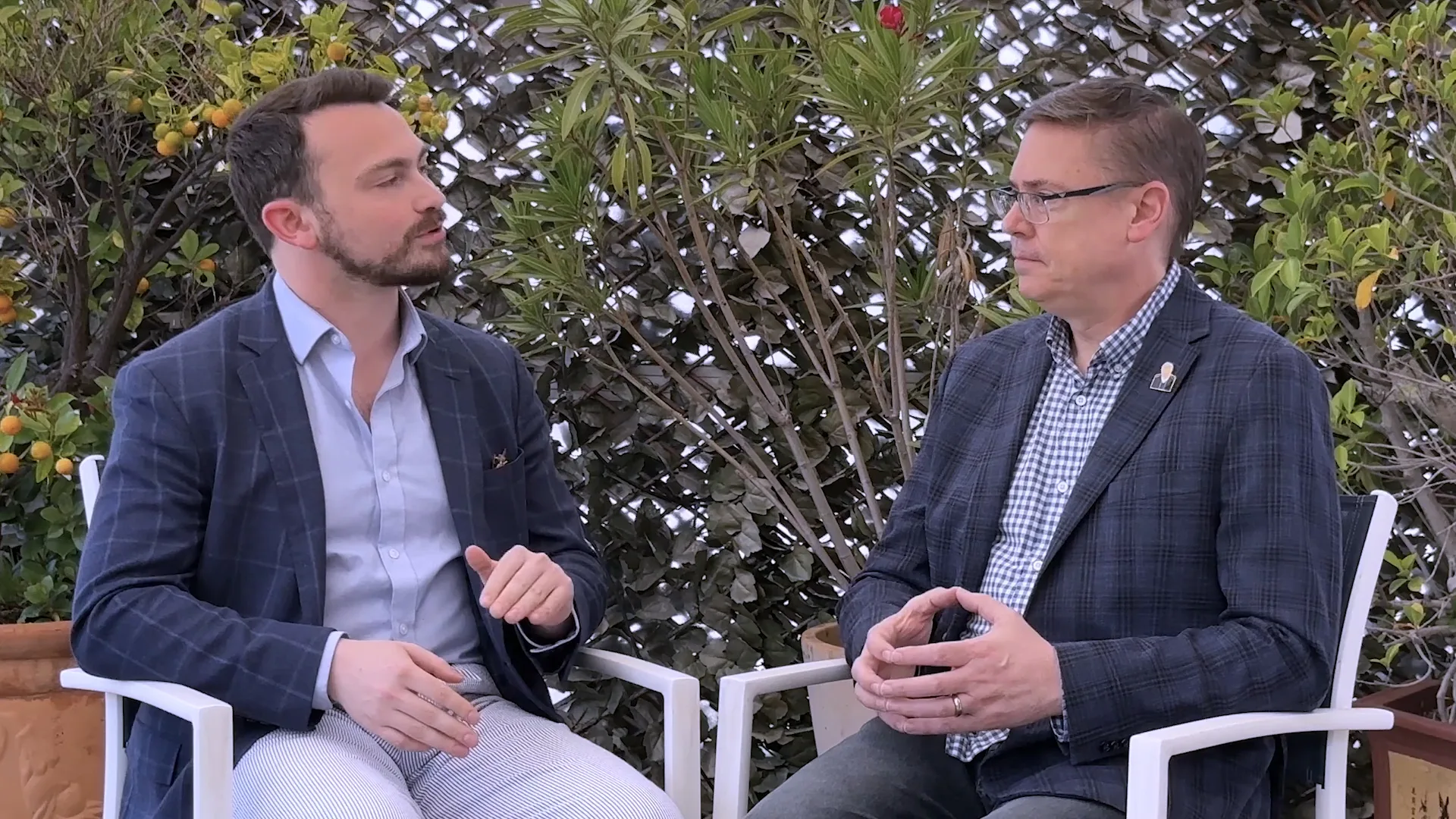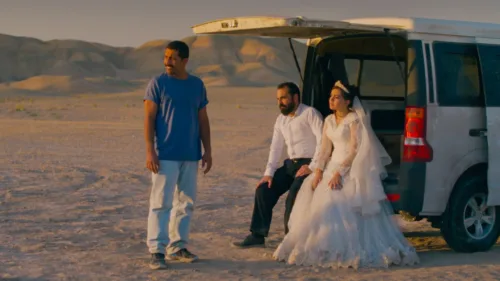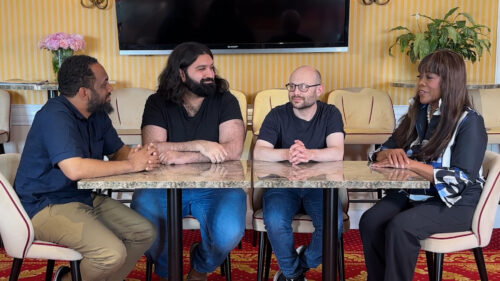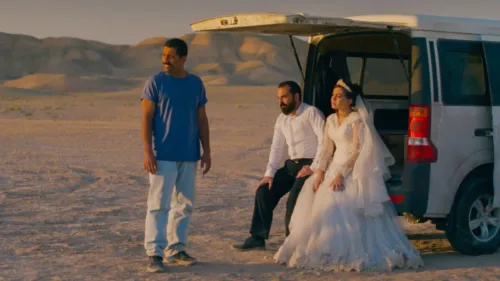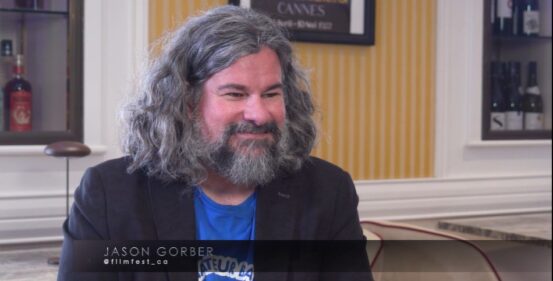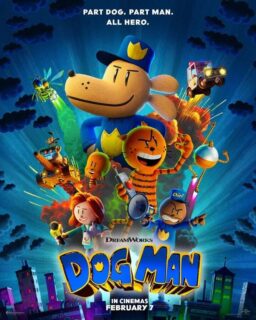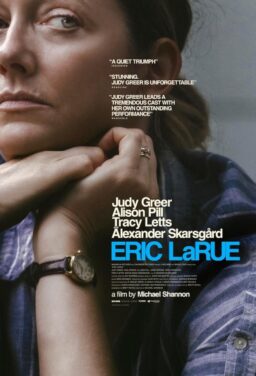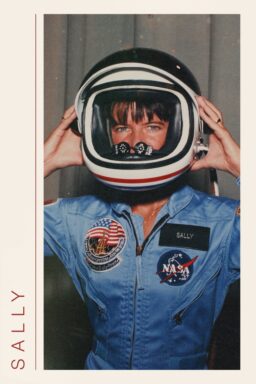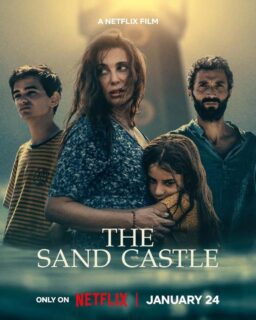The 2025 Cannes Film Festival is underway, and Chaz Ebert is on the ground to report on every development. In today’s video, Scott Dummler sits in to talk with contributor Isaac Feldberg to talk about the fest so far. Watch the video below.
Scott Dummler:
Welcome to Cannes 2025 with Chaz Ebert. As you can tell, I’m not Chaz Ebert. My name is Scott Dummler. I’m the co-producer of these video segments with Chaz each year here in Cannes. But today, I get to talk to one of my favorite critics of all time, Isaac Feldman. How are you, Isaac?
Isaac Feldberg:
I’m doing well, Scott. It’s quite an introduction. Thank you for having me today.
Scott:
I say to everyone, though, so, yeah, you know, everybody’s my favorite.
Isaac:
Good to know. It’s consistent.
Scott:
Exactly. How’s your Cannes going so far?
Isaac:
It’s been wonderful. I mean, there’s no better place to see movies each year than this. And even though the competition is just getting underway, I think there’s been some clear highlights, some standouts that I’m excited to speak with you about. And, so much happening as well outside of that main competition. I remember every time that I come to you can just how many things are happening in sidebar sections and the layer cake nature of this festival, in terms of everything happening outside of that main grand theater?
Scott:
Absolutely. One movie that I saw last night that I think you saw as well, was Eddington, the new Ari Aster film. What did you think of that?
Isaac:
I was quite impressed by Eddington, and I say that with no slight surprise, given how negatively I responded to his previous film. Another magnum opus called Beau Is Afraid. But Eddington I was quite taken with. I think he’s found a way to open this climate of fear and anxiety. That cloud so many of his films to a national stage.
And that’s progress. That excites me. How about yourself?
Scott:
I love all of his previous work, actually, including Beau is Afraid. I had very high hopes for this film, and it didn’t quite match my my high expectations. I felt like his this was him reaching for some dark comedy more than he has in the past. And I felt like for me it didn’t quite land. But, he’s making some very poignant comments about what’s going on in our society, framing it in the early days of Covid.
(EDDINGTON CLIP)
Isaac:
As a pandemic Western, I felt that he found a way to take the containment, the literal containment of that setting, the restriction on that, and explore a whole abundance of American pathologies that are kind of in conversation with each other and contradicting each other through the character played by Joaquin Phoenix, who’s a small town sheriff.
Scott:
Who is fantastic.
Isaac:
Fantastic, and whose decision to run for mayor couldn’t have more catastrophic consequences for everyone around him. And there is, you know, a kind of trickster-esque quality into Ari Aster. He is plays a bit of puppetmaster with his characters. I always think of him as kind of making movies like a child burns ants under a magnifying glass, but I felt like he was able to put all of us under that magnifying glass in this one, rather than just a sort of veiled caricature of himself and his own anxieties.
And so I felt that he was quite successful in being able to sneak in a lot, well, not sneak in directly address so many different political issues that were consuming the country at that point, and continue to.
Scott:
All right, you’re already selling me. I’m upping my review by half a star, at least after talking to you. What else have you seen in some of the parallel sections that you’ve liked?
Isaac:
In the Un Certain Regard section sidebar that is quite prestigious here at the Cannes Film Festival last night, Kristen Stewart’s directorial debut, The Chronology of Water. Which I was quite taken with as well. It’s quite a visually bold and elliptically structured film. It tells the story of the life of a swimmer, a writer, and, just a really complex individual named Lydia you’ve never met who is a very acclaimed author, in part because of her work with the experimental writing school that Ken Kesey briefly ran.
But she is also a survivor of parental abuse, quite horrific abuse that the film details, in very sensory, abstract fashion. And that is still very potent, and striking. And Kristen Stewart is, of course, a very known presence at the Cannes Film Festival as an actress. But to see her take this leap, to have written the screenplay, directed the film.
This is a project that took her seven years to bring to the screen when she first read the material and was taken with it. And it’s easy to see why. I mean, Kristen Stewart is an actress who really has mastered the art of expressing psychic pain through understatement. There’s so much in this film that could have been overwrought, that could have been done in a melodramatic or hamfisted way, but it is a very subtle and it is a very expressive film, and the visual metaphors that it finds are often not the ones that you would first expect to find in a film.
That is, of course, so based around water and the many kind of metaphorical properties that that holds both in the author’s life and on the screen.
Scott:
Great, great. Well, if you’ll indulge me, I’d love to talk about my favorite film of the festival so far, which is Sirat by the director Oliver Laxe. Have you seen Sirat? What did you think?
Isaac:
It is one of those rare treats of Cannes. When you get to see a film for the first time with an audience that leaves them gasping and reeling, and there are some moments in out. And I think that you’ll speak to this as well, that are just some of the most breath breathtaking, twists, in terms of the dramatic intensity that they volley the film up with, that I’ve seen in the history of coming to Cannes.
Scott:
Yeah. The film follows sort of a standard narrative path for the first 45 minutes or so, and then there is a shock, which is as jaw dropping as anything I’ve seen in a film in years.
(CLIP of SIRAT)
Isaac:
This is, a film about a father and a son, who go looking for their missing, daughter and sister, respectively, in the rave scene in Morocco. And it’s a film that, really takes a lot of inspiration, I would say, from The Wages of Fear and Sorcerer, these films that, find their characters on a road potentially to a grand, existential nowhere, but certainly through hazardous conditions in exotic locations.
I’ve heard this, compared to The Vanishing, another really shocking film in terms of the kinds of intensity of the twists it contains. But Serrat, in terms of a pure audiovisual experience, is certainly the most overpowering thing that I’ve seen so far.
Scott:
Definitely. Now, as we all know, Sean Baker is sort of the IT filmmaker of the of the day. He won the Palme d’Or last year, and of course, the Academy Award for Best Picture, among other Oscars that he won for Anora. He’s back. But as producer on a film, can you talk a little bit about that?
Isaac:
Left Handed Girl, which is a film that reunites him with his longtime collaborator Shih-Ching Tsou, from Take Out one of his his very first films. But it follows, really, three generations of Taiwanese women, as they are navigating life in Taipei. And it brings Taipei to life with such texture and vibrancy that you’re really transported there.
I think one of the hallmarks of Baker’s filmmaking, that is really worth noting here, is the immediacy, the way it drops you into these settings with these characters, who are often on the outskirts with true skill and grace and empathy, which I think is is worth noting here. Just because Left Handed Girl, the title refers to the young daughter, a very young girl who’s a brilliant emerging actress, who is navigating kind of her her coming of consciousness and coming of morality in this setting with a slightly unconventional family framework, an older sister who is quite maternal and a mother who is quite exhausted from the effort of running the stands that she runs, the food stands to make ends meet, for their family. It’s titled Left Handed Girl because after a conversation with her quite conservatively minded grandfather, the young girl who’s at the heart of the film becomes convinced that her left hand is the devil’s hand, and takes out his license to start pilfering some items from around the shopping province.
Scott:
And Baker not only produces, but I believe he co-wrote the screenplay and also edited the film. So you felt like you were seeing some threads of of his work, even though it’s not his work as a director?
Isaac:
Absolutely. It feels of a piece with Baker’s work, but it also feels like the emergence of a new talent. And I think that her handling of this story of these characters is so tender and so funny and so frank, and surprising in all of its many twists and turns that I really can’t wait for people to see more from her in the writer director chair as well.
And it speaks. I think, to a trend here at the Cannes Film Festival. Of course, Anora was one of the big prize winners last year, won the Palme d’Or on its way to winning a host of Oscars, including Best Picture. I think that the world is really, attuned to the rhythms of filmmakers like Sean Baker, like Shih-Ching Tsou, who are willing to kind of train their lens, their camera, and all of their craft on characters that you haven’t seen before, on stories that you might, you know, have seen in more conventional frameworks, but also in locations that you haven’t seen before.
And I just see this film likely to be embraced in just as strong away as anything that Sean Baker has made today.
Scott:
Well, that’s high praise and I can’t wait to see it. I haven’t seen it yet, but I’m really looking forward to it. But I know there’s one more film you wanted to talk about. From the French Moroccan director Robin Campillo. He was in competition a number of years ago with 120 BPM, which I saw, but I’m not that familiar with his work.
What’s he brought to Cannes this year?
Isaac:
He’s in Cannes with a film called Enzo, which is a coming of age film born out of a collaboration between Kim Po and the late French director Lorena Cantet. Cantent tragically passed away before he could begin production on this film, and it was agreed between between himself and Campillo that Campillo would finish the project, and it feels like a beautiful marriage between their sensibilities, their view of human conflicts, and their view of class as well.
The film follows an affluent teenager named Enzo, who has a coming of age, but also just a moral awakening when he takes a job on a construction site and becomes close and feels pulled towards a Ukrainian, worker on the site named Vlad. And his relationship, his budding relationship with this construction worker completely destabilizes everything that he thought he knew about the world, and bursts the bubble of wealth and privilege that he’s been raised in, in a way that also brings him into quite thoughtfully handle conflict with his very loving parents, who just want him to stop hurting himself and enjoy his life.
But he can’t do that. And I think that his agonized conscience is something that makes this film. If I was to draw a comparison, something akin to a more class conscious and less overtly romanticized Call Me by Your Name in terms of its sun dappled sensibility, the way that it depicts the scenery, the way that it draws the relationships between its characters.
But I would say that whereas Call Me By Your Name really reveled in the statuesque dolce vita, bearing of its setting in its characters, this film is very conscious of those, kind of signifiers of wealth, and it’s looking to to talk about those directly, in conflict with, among other issues, the current war in Ukraine.
And so this is a very poignant film. It’s, one that I’ve heard a lot of great things about from fellow critics as well who’ve seen it. So I’m not alone on this count. But it is absolutely a worthwhile addition to your watch list if you are checking that off in your future days of Cannes.
Scott:
Great. And you had an interview with Campillo?
Isaac:
That’s correct. That will be coming soon to RogerEbert.com. We had a delightful conversation about everything from the class allegories in the film that we were just discussing to the, presence of Bresson in terms of his approach to filmmaking, including on his focus on the hands, both the softness and the relative callousness of various characters hands in the film.
And one thing I will tease is that Campillo spoke about being a hand model for in L’Argent at a point earlier in his life. So readers have all of that to look forward to.
Scott:
Well, if you’re going to be a hand model, that’s the that’s the movie to be a hand model for, right?
Isaac:
Absolutely. No one’s going to love your hands more than Bresson.
Scott:
So speaking of RogerEbert.com, I wanted to mention that the reason both you and I are here because of Chaz Ebert and the reason Chaz does all this with with all of us, at least one of the main reasons is to tribute Roger Ebert and his unique, relationship to this festival. This film festival, Cannes, was very important to Roger.
So I just wondered if maybe you had a favorite review, or anecdote about Roger that you could share with us.
Isaac:
One review that I would point to you. And it’s funnily enough, it’s not for a film that, played at Cannes, but is, for a first time feature filmmaker, Jeff Nichols. The film is Shotgun Stories. And the reason I mentioned that, and the reason I’m thinking about it, is because Roger was one of the people who saved that film from obscurity and really elevated its profile to the degree that Nichols’ next film, Take Shelter, was invited to Cannes.
And I think that one of the things that Roger’s reviews always capturing crystallized so beautifully for me, are the potential for films to be empathy machines, and of course that famous quote of his that will endure. But in Shotgun Stories, he specifically speaks to the way that Nichols, despite coming from very humble means, making the film kind of in the environment that he knows very well of Arkansas.
He finds a way to bring characters to life that Roger hadn’t seen before. He finds a way to really earn your empathy and earn your love for those characters, earn your investment in them. And he he puts it so poignantly and so beautifully in the review. I recommend that everyone go read it. It’s one of those sterling examples of the way that he can distill that life philosophy to a couple of perfect sentences.
Scott:
I love that, and I love talking to you about movies at Cannes. Thank you so much for being here, Isaac, and enjoy the rest of the festival and safe travels back home.
Isaac:
Thank you Scott, it’s a pleasure to be here.
Chaz:
Well, throughout the festival, be sure to check in at RogerEbert.com for daily reports by our writers, along with our regular video reports. Until next time, au revoir.

